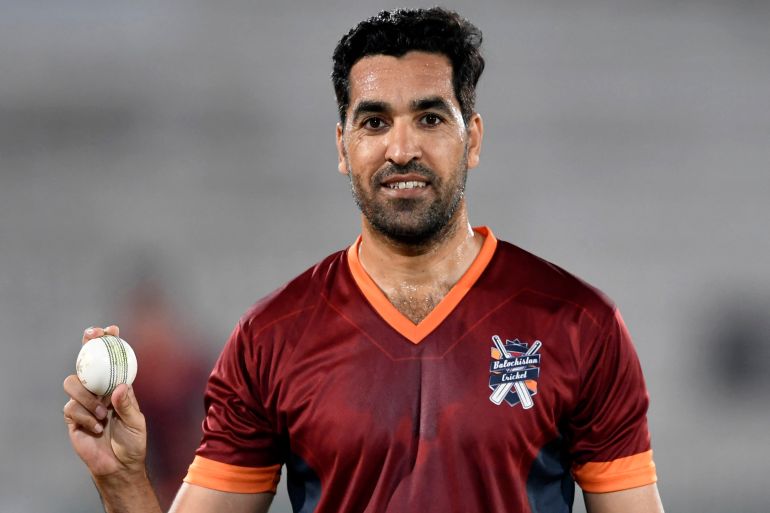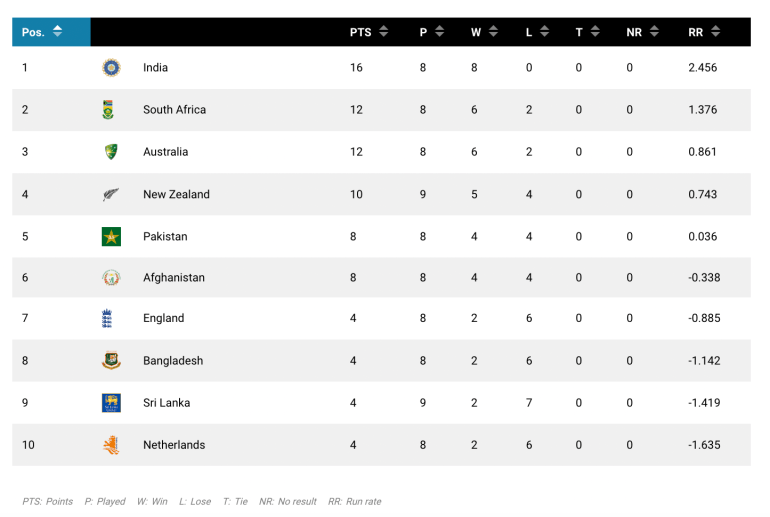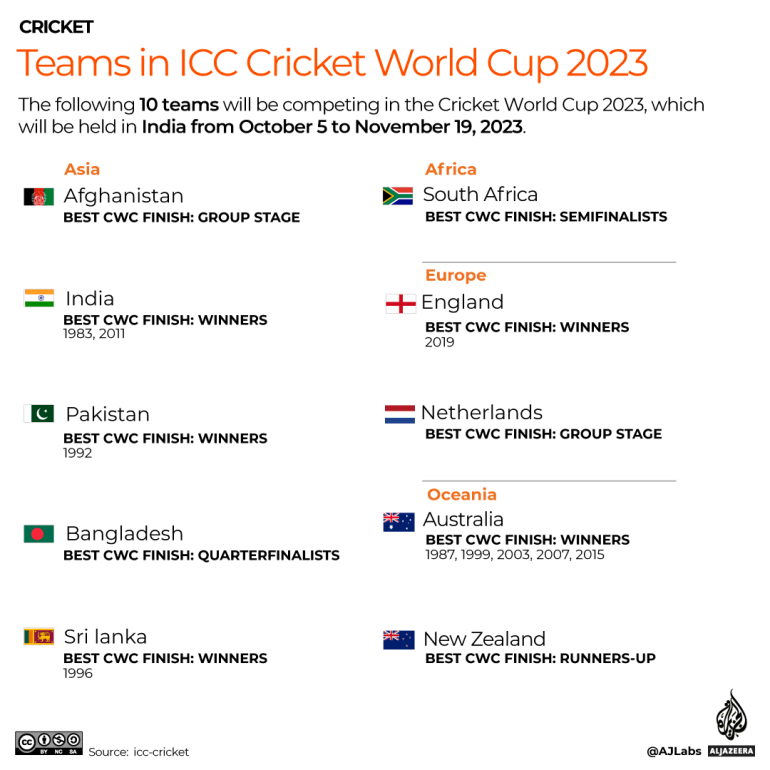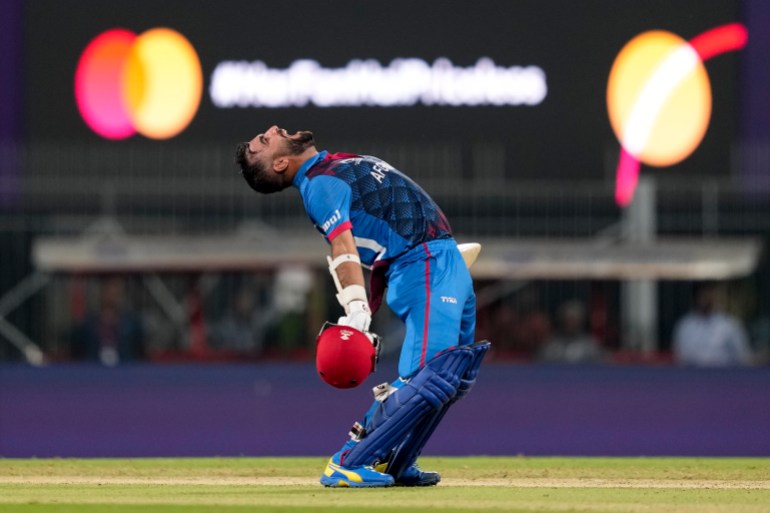Afghanistan needs help to build on Cricket World Cup success, Umar Gul says
Ex-Afghanistan bowling coach tells Al Jazeera about the country’s challenges and cricket’s role in cross-border tension.

The International Cricket Council (ICC) must increase funding to Afghanistan or risk reversing the success that brought them to the verge of the World Cup semifinals, according to the country’s former bowling coach Umar Gul.
Afghanistan face South Africa in Ahmedabad on Friday knowing a win will give them an outside chance of qualifying for the final four, although New Zealand will likely nab the last remaining spot over Pakistan and Afghanistan with a better run rate.
Keep reading
list of 4 itemsDon’t say ‘upset’: Shahidi on Afghanistan’s thrilling Cricket World Cup run
‘We’re dreaming’: Afghanistan crush the Netherlands at Cricket World Cup
Photos: Afghans fleeing Pakistan lack water, food and shelter
It has been a remarkable rise for a nation whose cricketing presence emerged only a little more than 20 years ago, with their first international appearance coming as recently as 2009.
“Afghanistan is the only associate team to improve a lot,” Gul told Al Jazeera.
“But they don’t have the finances to improve their cricket [further]. They don’t have sponsors.
“In a recent ICC board meeting, the Pakistan chairman and some others agreed to give them more money to help.
“But the ICC should increase their fees and agreement so they can improve their domestic structure and their players.”

At the 2019 World Cup in England, Afghanistan finished bottom of the group with nine defeats from nine games.
In their debut tournament in 2015, at that time a 14-team event, a one-wicket win with three balls remaining against Scotland handed them their only victory and saw them finish second bottom above their opponents.
This year’s World Cup started with a six-wicket defeat to Bangladesh in Dharamshala. Since then there has barely been any looking back – winning four and three thereafter.
Indeed, but for the individual brilliance of Glenn Maxwell, with an innings many regard as the finest in World Cup history, in Australia’s three-wicket win against Afghanistan on Tuesday, a semifinal spot really would feel like it was within reach.
“It’s all due to their will and dedication that they have improved a lot,” said Gul.
“In this World Cup they are looking like a totally different team: the way they are bonding, fielding and especially batting.
Former Pakistan fast bowler, Gul, spent a year as Afghanistan’s bowling coach alongside the still-current head coach, Jonathan Trott.
Gul, 41, says a huge amount of credit has to go to the former England batter for the improvement in the fortunes of the international team, who play and train out of the ICC Academy in Dubai.
“We must give credit to the coaches. Last year, Jonathan Trott and I joined the team and we must give credit to him – the way he is working and the way the boys are responding.
“The players are keen to win the matches and the best part is they are focusing on the day and the match and they are not looking ahead at the whole World Cup.
“They are playing as a unit and as a team and they are in the semifinal race.”

But for Gul, the domestic game needs to be supported more to ensure this is not merely a golden generation that fizzles out.
There was progress on the club level this year when Afghan sides Hindukush Strikers, Mah-e-Par Stars, Maiwand Champions and Pamir Legends played in the inaugural Ahmad Shah Abdali 4-day Tournament.
“[But] they don’t have that many facilities back at home,” Gul continued.
“They don’t have a proper domestic structure. Recently they just started the first-class season but they only have four teams.
“They need to correct their domestic structure and increase the teams so that they have the potential to improve at international level.”
The greatest challenge along with funding from the top down is convincing coaches to come from overseas to help, due to the security situation and finances.
“The foreign coaches don’t want to go there because of the situation from the last 30 or 40 years where they have been at war,” Gul said. “They don’t want to go to Kabul where the NCA [National Cricket Academy] is.”
Meanwhile, the rise of the Afghanistan team has culminated in incredible individual careers that can inspire new generations.
Rashid Khan, Mujeeb ur Rahman and Mohammad Nabi have all played in the Indian Premier League and are the pin-up boys of Afghan cricket.
Gul, who himself played in the IPL as well as 237 times for Pakistan, is very much of the belief though, that the superstar status the players now hold can continue to produce fine players.
“Rashid, Mujeeb and Nabi are the role models and the youngsters follow them.”

‘Sport brings people together’
Gul is from the Peshawar region of Pakistan, which borders Afghanistan, and he also told Al Jazeera of cricket’s effect on rising cross-border tensions.
The cricketing rivalry with Pakistan has threatened to spill a little too close to politics for the liking of many at this tournament.
Gul, however, believes that cricket can, in fact, soothe so many of the issues outside the playing arena.
“I’m from close to the [Afghan] border, 30 minutes travel, most of the Afghanistan players, especially the senior guys, their families live there and in Rawalpindi,” he said.
“The PCB and Pakistan players helped a lot of Afghan cricket and I still remember Nabi, even Rashid, played with us in club cricket and we know each other from recent years.
“Politically, I can’t say anything, but in Peshawar and Afghanistan they love each other – until it comes to the match and they want to win for their country.”
He added that the Pakistan-Afghan rivalry is relatively recent.
“Sport is the only thing which can bring the countries together.”
